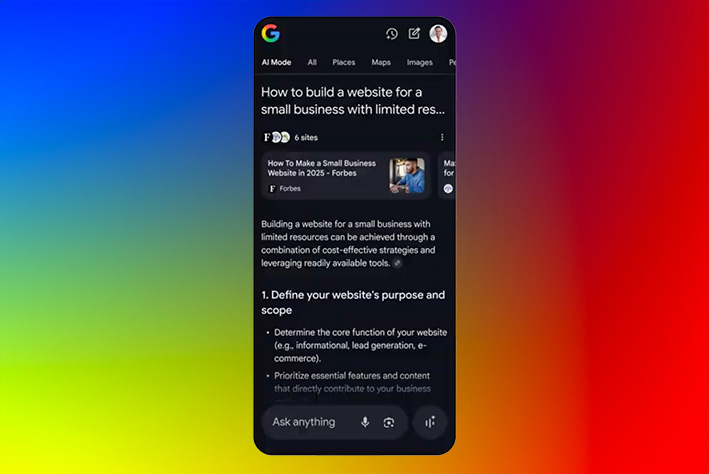Google expands ads on AI Overviews as it begins tests on AI Mode

Google is bringing search and shopping ads to AI Overviews on desktop in the US and on mobile in most English-language countries.
Meanwhile, the tech giant will soon begin testing ads on its new AI Mode generative-AI search engine, with ad placements below and integrated into AI Mode responses.
AI Mode launched in the US earlier this week, just two-and-a-half months after it entered testing phase with consumers. The feature aims to reinvent the search experience by allowing users to engage in conversation with a chatbot.
The announcements were just part of a slew of new generative-AI tools unveiled for marketers at Google’s Marketing Live event on Wednesday.
“The future of advertising fuelled by AI isn’t coming — it’s already here,” Google Ads and Commerce vice-president Vidhya Srinivasan declared in a statement.

Agentic, Smart Bidding Exploration, Asset Studio and more
Dan Taylor, Google’s vice-president of global ad sales, told a group of journalists that AI is already changing search behaviour, with queries now becoming more complex, longer and conversational.
“Traditional media planning and marketing tactics are not able to keep up with this reality,” he argued. “Marketers are really needing to rethink how they reach audiences to make meaningful connections.”
To that end, the tech giant unveiled a number of additional AI features for marketers to take advantage of. These include agentic capabilities in Google Ads Manager and Google Analytics that allow marketers to employ AI assistants to “take a lot of guesswork out of achieving business goals”.
“We really see the promise of agentic as the next frontier of increasing efficiency and performance with less effort,” Taylor said.
‘End of an era for search as we know it’? Publishers grapple with gen-AI search
Google is also launching “the biggest update to smart bidding in over a decade” through the new Smart Bidding Exploration feature. An opt-in tool, it allows marketers to use AI and flexible return-on-adspend targets to suggest brands advertise against search queries that “you might not necessarily have thought would be commercially relevant to your business”.
According to Taylor, campaigns using this feature in testing saw an 18% average increase in unique search query categories with conversions.
The tech giant is also integrating a unified creative suite of generative-AI tools via a new Asset Studio within Google Ads Manager.
For merchants using its Product Studio, a new feature called Generative For You will allow them to upload their entire shopping catalogue, enabling Google to generate on-brand images and videos to be used across its platforms.
Taylor indicated that the number of advertisers using Google AI for generating creative imagery has more than tripled (+250%) in the past year, suggesting that these tools are “something our customers are really asking for”.
The future of branding: Influence LLMs to protect your share of market
Impact on click-through?
Google’s move into AI search has caused significant upheaval in the world of online publishing and marketing.
Publishers have begun reporting severe declines in referral traffic from Google as consumers now receive AI-generated answers to queries without the need to click through links to acquire answers to queries.
Commentators have estimated that there has been an average decline of referral traffic of at least 25% and SEO agency Authoritas has indicated that click-through rates have been reduced by between 40% and 52% on desktop.
According to a report from Press Gazette, MailOnline has seen a 56.1% decline in click-through rates on desktop when AI Overviews appear for a relevant search query.
Despite this coverage, Google leadership has continued to argue that AI Overviews are benefiting publishers. Liz Reid, Google’s head of search, has previously written that “links included in AI Overviews get more clicks than if the page had appeared as a traditional web listing for that query”. However, Google has not publicised evidence proving this is the case.
Douglas McCabe, CEO and director of publishing and tech at Enders Analysis, declared recently that the “centrality of the website is declining for many brands“, with sites “no longer the primary destination for consumers as it struggles to meet expectations while AI erodes publisher monetisation”.
When pressed by The Media Leader on whether brands risk falling into a similar problem, wherein ads or recommended links to their website within AI Overviews could lead to a decline in click-through rate, Taylor replied: “We’re seeing that people are finding ads within AI Overview results helpful. We’re also seeing the overall volume of queries on Google Search increase, including commercial queries.
“For AI Overviews specifically, what we’re seeing from a monetisation standpoint is that the monetisation is approximately at the same rate as prior to AI Overviews in terms of click-through rates and all the rest. We think that gives us a strong base from which we can innovate more.”
Brands, meanwhile, are already planning for a new era of AI SEO by creating and posting content online with the expressed intent of biasing large language models into portraying their brand in a positive light.
‘Death of the website’: Publishers wrestle with the need to reinvent in AI era




